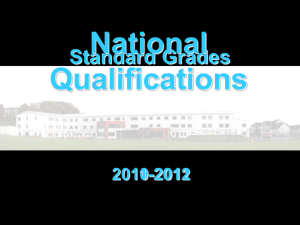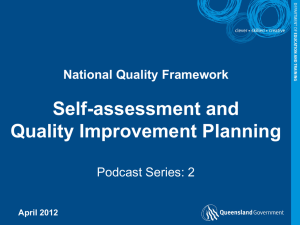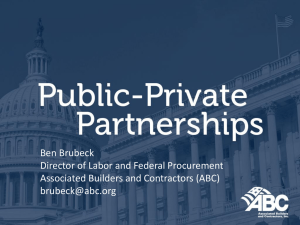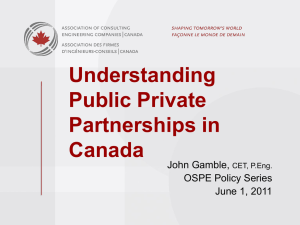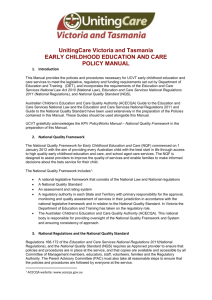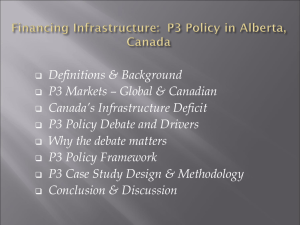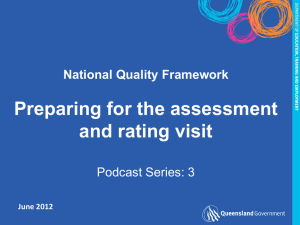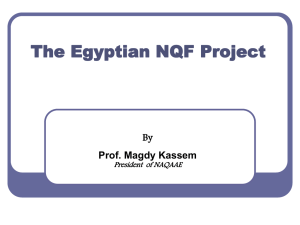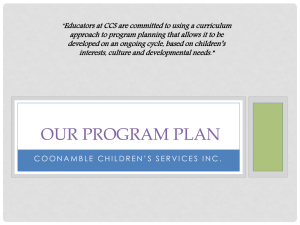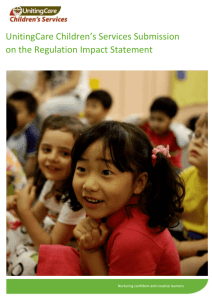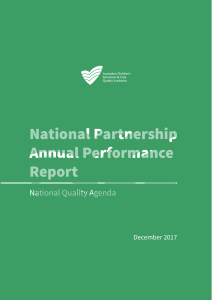CPS Child & Family Centre - Deloitte Access Economics
advertisement
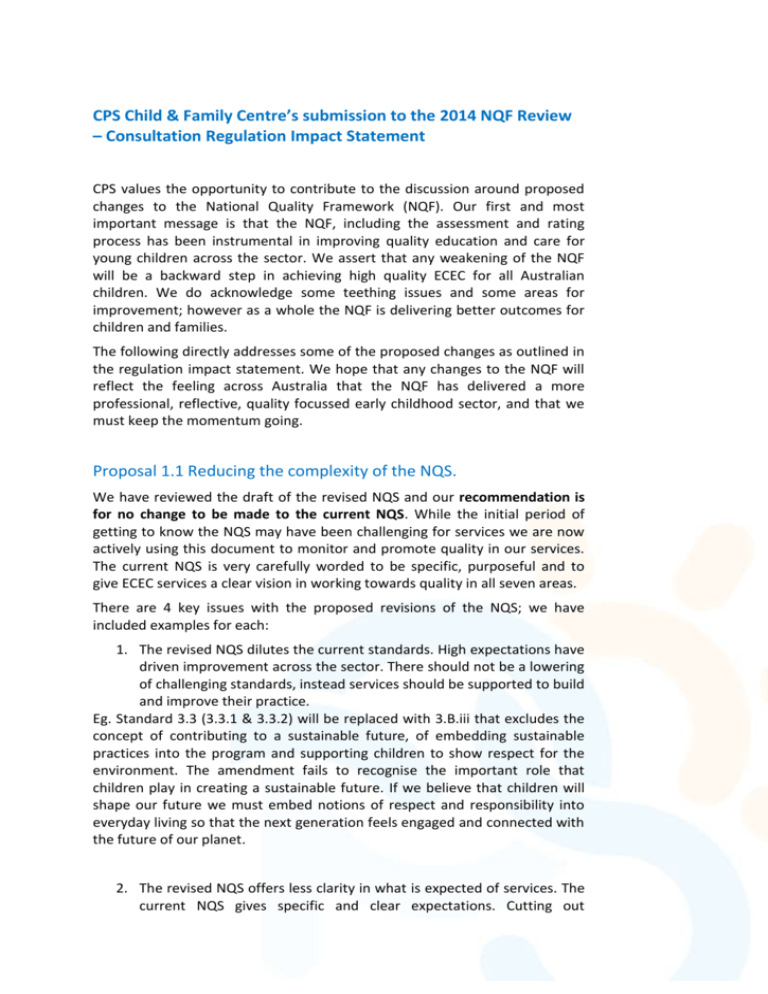
CPS Child & Family Centre’s submission to the 2014 NQF Review – Consultation Regulation Impact Statement CPS values the opportunity to contribute to the discussion around proposed changes to the National Quality Framework (NQF). Our first and most important message is that the NQF, including the assessment and rating process has been instrumental in improving quality education and care for young children across the sector. We assert that any weakening of the NQF will be a backward step in achieving high quality ECEC for all Australian children. We do acknowledge some teething issues and some areas for improvement; however as a whole the NQF is delivering better outcomes for children and families. The following directly addresses some of the proposed changes as outlined in the regulation impact statement. We hope that any changes to the NQF will reflect the feeling across Australia that the NQF has delivered a more professional, reflective, quality focussed early childhood sector, and that we must keep the momentum going. Proposal 1.1 Reducing the complexity of the NQS. We have reviewed the draft of the revised NQS and our recommendation is for no change to be made to the current NQS. While the initial period of getting to know the NQS may have been challenging for services we are now actively using this document to monitor and promote quality in our services. The current NQS is very carefully worded to be specific, purposeful and to give ECEC services a clear vision in working towards quality in all seven areas. There are 4 key issues with the proposed revisions of the NQS; we have included examples for each: 1. The revised NQS dilutes the current standards. High expectations have driven improvement across the sector. There should not be a lowering of challenging standards, instead services should be supported to build and improve their practice. Eg. Standard 3.3 (3.3.1 & 3.3.2) will be replaced with 3.B.iii that excludes the concept of contributing to a sustainable future, of embedding sustainable practices into the program and supporting children to show respect for the environment. The amendment fails to recognise the important role that children play in creating a sustainable future. If we believe that children will shape our future we must embed notions of respect and responsibility into everyday living so that the next generation feels engaged and connected with the future of our planet. 2. The revised NQS offers less clarity in what is expected of services. The current NQS gives specific and clear expectations. Cutting out standards and including them under one umbrella standard reduces clarity and gives services less information to base their practice. Eg. Standards 7.3, 7.3.1 – 7.3.5 & 7.1.5 will be reduced to the very broad 7.A.ii. The current standards around administration and management give services clear goals and quality indicators to work towards. The revised standard is too broad to give any guidance as to what quality looks like in this area. The aim of the NQS is to provide a framework for improvement, our concern is that this amendment gives a vague idea that decision making and systems are important but offers no specific advice on how to achieve them. 3. The revised NQS is change for the sake of change. Many of the revised standards have the same message as the current NQS but with different wording. For an industry that has undergone such huge change over the past few years there is a high level of change fatigue and no room for unnecessary amendments. The current NQS is expertly worded; there is no need to re-write it. Eg. Current Standard 4.2.2 reads, “Educators, co-ordinators and staff members work collaboratively and affirm, challenge, support and learn from each other to further develop their skills, to improve practice and relationships.” The revised standard 4.B.i reads, “Management, educators and staff work collaboratively and interactions convey mutual respect, equity and recognition of each other’s strengths and skills.” This statement carries most of the same intent however it removes the idea that educators challenge and learn from each other, a key part of effective collaborations. 4. The current NQS gives a key statement at the beginning of each quality area. This statement sets the tone and expresses the ideals of high quality under the standard. It would be counter-intuitive to remove these driving statements. Eg. Current Quality Area 7. Staffing arrangements. “Effective leadership and management of the service that contributes to quality environments for children’s learning and development. Well-documented policies and procedures, well-maintained records, shared values, clear direction and reflective practices enable the service to function as a learning community. An ongoing cycle of planning and review, including engagement with families, creates the climate for continuous improvement.” This statement is additional information to guide services towards better outcomes for children and should not be removed. Proposal 1.5 – Exceeding the National Quality Standard rating & Proposal 1.6 Removing the excellence rating The assessment rating received by a centre should accurately reflect their level of quality across the 7 quality areas. CPS strongly advocates for distinction in early childhood education and care; however we feel that the cost burden in applying for excellence is too high. We assert that the excellence rating should be available to centres who achieve exceeding in all seven standards and that it should not require a regular payment as this is not sustainable for community and not for profit centres. Excellence should be based on merit, not on performing additional tasks and making a payment. Proposal 2.1 Removing the requirement for supervisor certificates The move to service supervisor certificates is a positive one in reducing cost and regulatory burden. We agree with changes to the supervisor certificates, and agree that services should have the responsibility of identifying responsible persons. Proposal 3.1 Expanding the scope of services under the NQF CPS strongly believes that the NQF has increased quality in services across the country. We conditionally agree to expand the scope of the NQF provided that there is support (e.g. financial) & consideration around how these services operate and the resources available to them in implementing the NQF. Proposal 4.1 Extending some liability to educators Children’s wellbeing and safety should be paramount in all services. We do not feel, however, that making educators liable will create safer environments for children. We would not support any changes that reduce the responsibility of leaders and management for the culture/safety of the service. We are also wary that educator liability may reduce or eliminate ‘risk taking’ in learning for children, a necessary part of challenging, & engaging educational programs. Proposal 1.7 – Ensuring ratings accurately reflect service quality It is important that the NQS rating accurately reflect the centre’s quality. CPS supports the current rating system but agrees that a service should be able to apply the current Minor Adjustments Policy if the standard can be remedied quickly. This would ensure that services who were ‘working towards’ in a small number of elements would not have to wait 2 years plus to be reassessed. Proposal 1.8 Length of time between assessments Timely and regular assessments are integral to the effectiveness of the NQF. CPS agrees that services who are ‘working towards’ the National Standard may need shorter time frames between assessments to support their development against the NQS. We do however; contend that 5 years may be too long to ensure quality in other services. Streamlining is needed to meet the current timelines as much as is practicable. We assert that the regulatory authority continue to work towards the current timeframes, using the earned autonomy system. If the current timelines are unworkable we would recommend 4 years, as a compromise. Proposal 5.4 – Increase in annual fee for approved services CPS understands the need to raise revenue for the ongoing application of the NQF assessment and rating process. We are, however opposed to the increase in fees for all services. Our Child and Family centre offers specialised education and care to vulnerable families. We are a not for profit centre with elevated costs associated with high staff ratios, an interdisciplinary approach to family support and intensive model of education and care. We propose that community based, specialist and not for profit centres be excluded from fee increases, as these impact unfairly on the ability to sustainably provide these services.
